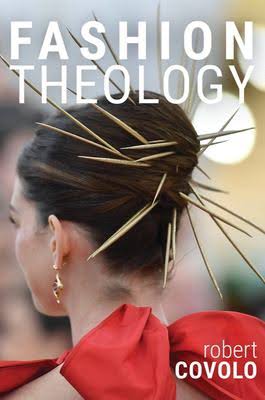
Book Review: Fashion Theology by Robert Covolo
It has long been asked, “what has Athens to do with Jerusalem?” I say forget about Athens, let’s talk about Paris, darling!
Fashion Theology is the first of its kind—this highly appealing book presents a serious and engaging study of the relationship between fashion and theology. Acknowledging the long-held assumption that fashion and theology do not typically mix, the author elucidates the fact that these two magisterial forces have indeed crossed paths many times before and still hold somewhat of a complicated and potentially rich dynamic.
Theology has indeed had much to say about fashion, and theologians throughout the centuries have held their own unique perspectives. Given their respective place and time, each theologian held a critical assessment of fashion. Based on the cultural climate of their day, they considered what would be the best way to approach fashion. This may be surprising on one hand, since one typically does not associate theologians addressing ephemeral matters but mostly weighty, eternal ones. On the other hand, it is not completely surprising in that clothing is such an intimate part of humanity. By simply wearing clothing and accessories, one enters into matters of fashion and how they relate to one’s life—whether one regards fashion highly or not.
Covolo offers premier examples of how theologians have wrestled with the topic of dress. Prominent theologians who have engaged with the topic of fashion include Tertullian of Carthage, Clement of Alexandria, St. Augustine, Thomas Aquinas, John Calvin, Abraham Kuyper, and Karl Barth. The views these men held were not cut and dry; they often held conflicting views about fashion. As leaders, they sometimes had to resort to placing aside their personal views and acting on what they believed would positively affect the broader church body. Having not been familiar with the significant figure of Abraham Kuyper, it was a delight to discover that he seriously considered fashion and sought to reframe it within a Christian narrative.
The author takes the reader on a journey through five critical intersections between fashion and theology: tradition, reform, public discourse, art and everyday life. As it is important to trace back the rich historical dialogue that has taken place between fashion and theology, it is equally important to address the present as well as future issues regarding the two. Consequently, the book examines how fashion, theology and public discourse could function together. One challenge would be that fashion and public discourse both stem from a secular background, which is opposite the sacred world that theology holds. Furthermore, a fascinating discussion of fashion and art emerges, where the two hold more in common today, due to their strong shift towards modernity. The last chapter presents a fascinating discussion that proves fashion is not only for the runway; in fact, the “runway” could be a very mundane part of one’s life. Fashion mostly involves daily dressing for the everyday, as clothing plays a pivotal role in the narration of our lives.
The issues that are explored within this book give one a clear picture of where fashion and theology have been, how they have been at odds and where they could be headed. Given the influence that fashion has had on the modern world, it would behoove theology to take fashion more seriously. On the same token, fashion should acknowledge just how much theology has been involved in its own domain, even affecting its trajectory. After all, the first fashion theorist may have been one of the most popular ancient theologians. Though constantly changing and sometimes pushing the boundaries, fashion still seeks to construct meaning. That is more so the fact with theology and the fundamental belief that humans were made in the image of God (imago dei) and naturally seek meaning even in the temporality of this life.
As a Christian fashionista who deeply appreciates fashion and theology, it was refreshing to read a work that winsomely explores the rich, yet complex relationship between the two areas in book format. The author gives just the right amount of overview in a relatively small amount of space, yet still satisfactorily manages to cover much ground. Understanding the immense scope and complexity of the two domains, the author acknowledges that his work does not cover all aspects of fashion and theology, nor does it seek to offer any hasty resolutions. However, he has given us enough information to satiate our curiosity, presented issues to reflect upon and opened the discussion for further exploration. The book is written in such a compelling way that both academics and the broader audience would enjoy. If you’re interested in this subject or if your curiosity has peaked even a little, I highly recommend.
Original review at: https://englewoodreview.org/robert-covolo-fashion-theology-review/
